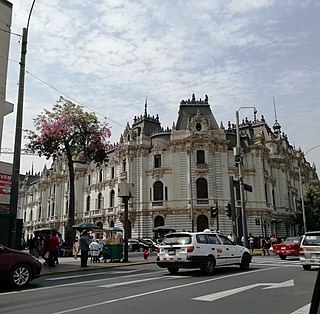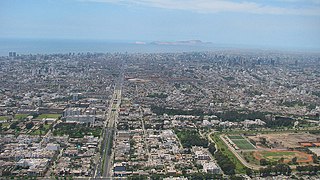
The history of Peru spans 15 millennia, extending back through several stages of cultural development along the country's desert coastline and in the Andes mountains. Peru's coast was home to the Norte Chico civilization, the oldest civilization in the Americas and one of the six cradles of civilization in the world. When the Spanish arrived in the sixteenth century, Peru was the homeland of the highland Inca Empire, the largest and most advanced state in pre-Columbian America. After the conquest of the Incas, the Spanish Empire established a Viceroyalty with jurisdiction over most of its South American domains. Peru declared independence from Spain in 1821, but achieved independence only after the Battle of Ayacucho three years later.

The Historic Centre of Lima is the historic city centre of the city of Lima, the capital of Peru. Located in the city's districts of Lima and Rímac, both in the Rímac Valley, it consists of two areas: the first is the Monumental Zone established by the Peruvian government in 1972, and the second one—contained within the first one—is the World Heritage Site established by UNESCO in 1988, whose buildings are marked with the organisation's black-and-white shield.

Wong is a supermarket chain in Peru. Known until 2005 as E. Wong, it was started as a small store in 1942 by Chinese Peruvians in a residential area of the Miraflores District in Lima.

The Jirón de la Unión, or Union Street, is a pedestrian street located in the Historic Centre of Lima, part of the capital of Peru. For many decades it was the most important boulevards of the city, often described as the most aristocratic, where many of the most affluent citizens of the city and most powerful men around the world would meet. Subsequently, with the deterioration of the center of Lima, the Jirón de la Unión lost its aristocratic character and became completely commercialized.

Tiendas Industriales Asociadas S.A., branded as Tía and sometimes known as Almacenes Tía, is a South American retailing brand founded in 1940. Its divisions in Ecuador and Uruguay trade under the brands Tía, MAGDA, Ta-Ta and MULTI AHORRO, where they are together the largest discount retailer, with over 450 locations. Tía S.A. (Colombia) operated 19 locations under the Tía brand, until it closed in 2017 because of poor sales.

Since 2016, Peru has been plagued with political instability and a growing crisis, initially between the President, Pedro Pablo Kuczynski and Congress, led de facto by Keiko Fujimori. The crisis emerged in late 2016 and early 2017 as the polarization of Peruvian politics increased, as well as a growing schism between the executive and legislative branches of government. Fujimori and her Fujimorist supporters would use their control of Congress to obstruct the executive branch of successive governments, resulting with a period of political instability in Peru.

Manuel Arturo Merino de Lama is a Peruvian politician who briefly served as President of Peru for six days between 10 and 15 November 2020. He also served as the President of Congress from 16 March 2020 to 15 November 2020. He was a Member of Congress (AP) representing the Tumbes constituency for the 2001–2006, 2011–2016, and 2020–2021 terms.

Hernando Guerra-García Campos, better known as Nano Guerra, was a Peruvian politician, businessman, and television presenter. He served as a congressman representing Lima for Fuerza Popular from 27 July 2021, until his death in office.

Dina Ercilia Boluarte Zegarra is a Peruvian politician, civil servant, and lawyer since 2022 serving as the 64th president of Peru. She had served as the first vice president and minister at the Ministry of Development and Social Inclusion under President Pedro Castillo. She served as an officer at the National Registry of Identification and Civil Status (RENIEC) from 2007 until 2022.

Following the ousting of president of Peru, Pedro Castillo on 7 December 2022, a series of political protests against the government of president Dina Boluarte and the Congress of Peru occurred. The demonstrations lack centralized leadership and originated primarily among grassroots movements and social organizations on the left to far-left, as well as indigenous communities, who feel politically disenfranchised. Castillo was removed from office and arrested after announcing the illegal dissolution of Congress, the intervention of the state apparatus, and the forced establishment of an "emergency government", which was characterized as a self-coup attempt by all government institutions, all professional institutions, and mainstream media in Peru while Castillo's supporters said that Congress attempted to overthrow Castillo. Castillo's successor Dina Boluarte, along with Congress, were widely disapproved, with the two receiving the lowest approval ratings among public offices in the Americas. Among the main demands of the demonstrators are the dissolution of Congress, the resignation of Boluarte, new general elections, the release of Castillo, and the formation of a constituent assembly to draft a new constitution. It has also been reported that some of the protesters have declared an insurgency in Punos's region. Analysts, businesses, and voters said that immediate elections are necessary to prevent future unrest, although many establishment political parties have little public support.
This is a broad timeline of the 2022–2023 Peruvian protests against the government of Dina Boluarte and the Congress of Peru, sparked by the self-coup attempt of President Pedro Castillo, who was later arrested for his actions. The protests were organized by social organizations and indigenous peoples who felt they experienced political disenfranchisement, specifically on the politically left-wing to far left, with the groups demanding immediate general elections and a constituent assembly to draft a new Constitution of Peru.

Peru–South Korea relations are the current and historical relations between South Korea and Peru. Both countries are members of the United Nations and the Asia-Pacific Economic Cooperation, and have resident embassies in each other's capital cities.

Oechsle is a Peruvian retail chain owned by Tiendas Peruanas S.A., a subsidiary of conglomerate Intercorp. Originally established as Casa Oeschle during the 19th century by A.F. Oechsle and best known for its Art Nouveau building at the Plaza Mayor, designed by French architect Claude Sahut. It closed in 1993 due to the economic crisis and internal conflict of the country, permanently reopening in 2009.

Chacarilla del Estanque, also known simply as Chacarilla, is a neighbourhood located in the districts of San Borja and Santiago de Surco, in Lima, Peru. An upper class area of both districts, it is located south of the Headquarters of the Peruvian Army and known for its commercial sector, most notably its shopping centre.













